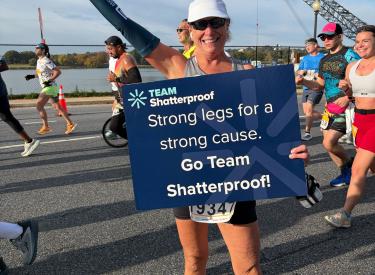
Coordinated Care Saved Me from Falling Through the Cracks
It’s 8 AM on a Tuesday in Dallas, TX. I am in my car, sitting in the parking lot of my new primary care doctor’s office off Central Expressway. While I watch people coming in and out of the office, I am guzzling down my third bottle of white wine. A bottle of pain pills is on the passenger seat, empty. The withdrawal symptoms are kicking in, and I will be in full-blown crisis shortly without help.
I contemplate approaching the doctor with my usual routine of asking for more pain medication (I severely injured my low back and neck in a sports accident several years prior), but I am at the end of my rope. I am sick and tired of being sick and tired. This way of living has become a complete hell. Opioids and alcohol are controlling my life.
I check in for my appointment. We go through the usual new patient questions. I finally build up the courage to tell the doctor I need help. Staring at the floor, I tell him the truth about how much I am drinking and how many pills I am taking. As I look up, our eyes meet. His face is aghast. He quickly looks away.
With his back turned to me, he mumbles something to the effect "we don’t treat those issues here." He tells me to talk to the nurse at the front desk as he quickly leaves the room.
Silence. I am sitting in the exam room alone. The feelings of guilt, shame, and embarrassment wash over me. I want to be invisible. I want to die. Then the anger builds. Screw this, I think. I am going to get high.
I grab my stuff, walk down the hallway and meet the nurse at the front desk to checkout. She has a look of complete disdain for me. No empathy. Not even pity. As I walk out the door, she hands me a piece of paper with the contact information for a few non-profits. I ball up the paper and throw it into the parking lot. Back in the car I twist open the cap to bottle number four and text my dealer. He responds right away, "How many tabs do you need?"
It will be more than two years before I find the courage to ask a doctor for help again.
***
Fast forward. I am back in a waiting room, but this time, I’m seeing a different primary care doctor. I’m here to deal with one of the many health issues I have developed as a result of my addiction. The feelings of shame and guilt are long gone; now, there is only a sense of resignation. The battle with opioids was lost long ago. I really don’t care if I live or die at this point.
The doctor comes into the room and asks how he can help. I start to discuss the long list of ailments I am suffering from, but he interrupts me. "No," he says, "how can I help you?"
I pause, not sure what to say. He asks again, "How can I help you?" I blurt out that I am addicted to opioids, alcohol, and benzos, and I begin to rattle off my daily intake.
He looks at me, square in the eye, and says, "Are you asking for pills or are you asking for help?" I stammer back, "I’m asking for help."
The doctor launches into action. He starts issuing orders. Nurses appear buzzing around the room. Vitals are taken. Detailed questions are asked and answered. Lab work and prescriptions are ordered. Appointments are scheduled with other physicians, psychiatrists, and psychologists. Calls to treatment centers are made. One of the nurses comes in with multiple packets of information. She smiles and tells me her brother is in recovery. She gives me his number and says she will pray for me to find recovery. I leave the office with my head spinning, but with a glimmer of hope.
This right here illustrates elements of the Collaborative Care Model.
It’s a team-based approach that brings mental health and substance use disorder specialists into primary care settings, equipping primary care providers with tools to identify and address addiction early and measure treatment progress. Here in Texas, Governor Abbott signed SB 672 into law in June, making this model more accessible to Medicaid patients. I’m thrilled to see my state leading the way on integrated behavioral health care.
Because for me, within a week of that appointment, I had been prescribed Suboxone and I was attending several AA meetings. The doctor’s office called repeatedly to check in with me. I realized that maybe I could hang on to get into treatment. Two weeks later, I met with a psychiatrist who prescribes several additional medications, and I met with my psychologist. Since addiction treatment is not a “one size fits all” situation, we discussed my treatment plan and evaluated all of my needs to ensure I’d be on the best path for me. The following week, I checked into rehab.
Things were moving so fast I could barely keep up. Was I really ready to get sober? Now, I was scared. Could I actually do this?
The medical system had actually stepped up to support me. Now it was my turn to stand up for myself.
It is now many years later from that day I checked into rehab. By the grace of God, I am sober today. I had a few more slips to go through after that rehab stay, a few more visits to rehab even, but my primary care doctor was always there to support me and get me the resources I needed. It was two steps forward, one step back, but I was clearly on the path to recovery. I had a taste of sobriety, and I had hope that I could get my life back.
Recently, I went to my primary care doctor for a checkup. The doctor checked all my lab reports, asked me a few questions, and then told me that I had made a complete turnaround. At 50 years old I was in perfect health. He once again looked me square in the eye, paused, and said, “I am proud of you.” I was speechless. As I walked out of the office, the nurse whose brother is in recovery gave me a smile and a big hug.
I walked to my car in the parking lot. I closed the car door, took a sip of my bottled water, and I started to cry like a baby. Thank God I am alive, I thought to myself. Thank God for all the people who helped me.
Where would I be if my new primary care doctor had treated me like that first doctor did?
Where would I be if he hadn’t marshaled the resources of the entire medical system to come to my aid? How many fellow people with substance use disorders haven’t received the same level of help I did? How many have fallen through the cracks and paid the ultimate price?
For someone with my experience, collaborative care was a lifesaver. Literally. Without coordination of care, I too might have fallen through the cracks.
Oh and P. S.: To all those who helped me. Thank you. You saved my life.
Chad Fahlberg is a Shatterproof Ambassador who lives in Texas.




